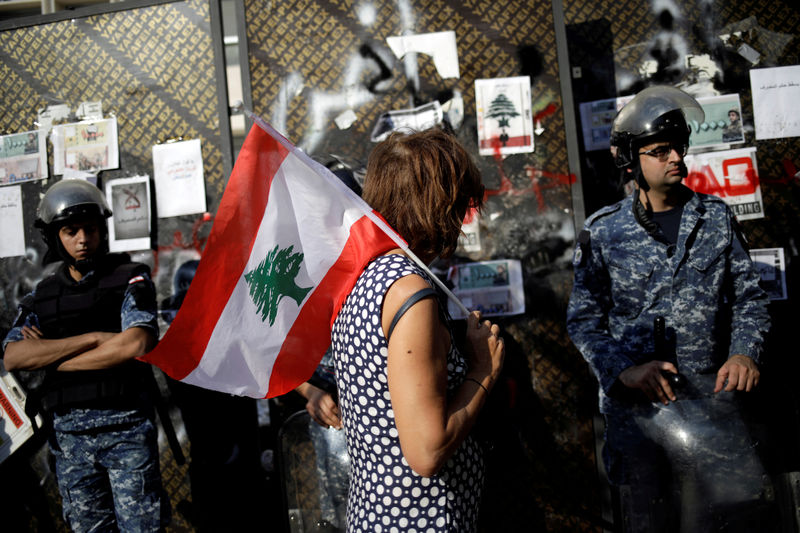BEIRUT (Reuters) - Controls imposed by Lebanese banks on access to cash are fueling concern among depositors who are worried for their savings despite government assurances they are safe from the worst financial crisis since the 1975-90 civil war.
Protests that have swept Lebanon since Oct. 17 have added to pressures in the financial system, deepening a hard currency crunch that has left many importers unable to bring in goods, forced up prices and increased fears of financial collapse.
The banks' response - tight withdrawal limits for hard currency and blocks on nearly all transfers abroad - has plunged many savers into deep uncertainty.
"There is concern, great concern: that if I have saved my whole life to get an amount and put it here, where will it go?" said Munir Faqih, a 66-year-old retiree whose hard currency savings are the fruit of 17 years working abroad.
"We are in a big crisis and I am very concerned for my savings," he said.
The head of banking association, in a Reuters interview last week, described the controls as "a fence to protect the system" until the situation returns to normal. The central bank has said deposits are safe.
But concern is widespread. The dollar withdrawal curbs have been steadily tightened since they were first applied at the start of November.
Blom Bank, one of Lebanon's largest, has gradually lowered its weekly withdrawal ceiling from $2,500 to $500 this week for depositors with less than $100,000 in their accounts. At Bank Audi, the limit is $300.
The crisis has shaken confidence in a banking system that has been a cornerstone of Lebanon's post-war stability.
The banks' role has been critical to the system by sucking in dollars from Lebanon's large Diaspora and recycling them to finance the heavily indebted state and Lebanon's trade deficit.
With the country's fractious sectarian leadership yet to name a new premier since protests prompted Saad al-Hariri to quit on Oct. 29, delaying reforms it needs to pull the economy from crisis, depositors worry their money is no longer safe.
"I don't believe in the government when they say my money is safe in the banks because they're not credible. This is something we've discovered," said a saver who gave his name has Michel and is worried that seven years of savings made while working in Africa are now stuck.
"People are withdrawing cash every week, as much as the bank is ready to give them," said Marwan Mikhael, head of research at Blominvest Bank.
"The problem is the banks do not know how long this crisis will stretch, so they have to bear in mind that they want to keep going for the maximum time possible."
"COMPLETELY LOST"
Some depositors said they would pull their remaining savings if only they could and regret not having done so already.
"We are completely lost. I don't know what is safe and what is not safe," said Antoine Bouez, 42, who works in financial services. Bouez said the $500 weekly limit hardly meets his needs.
The protests, fueled by rage against a ruling class seen as looting Lebanon, have slowed an already weak economy. Many businesses have shed jobs or slashed salaries and moved workers onto part time.
Those seeking dollars must rely on an increasingly expensive parallel market, where the Lebanese pound's value was around 40% weaker than its official rate on Tuesday.
Straddled with one of the world's highest public debt levels, Lebanon's foreign currency reserves are set to come under further pressure this week with the repayment of a $1.5 billion Eurobond.
"The bank is making you feel like you are begging for your own money," said a depositor who was forced to prove that his $1,000 withdrawal was needed to buy medicine for his mother.
"I doubt that Lebanese will return to put their money in the banks."
